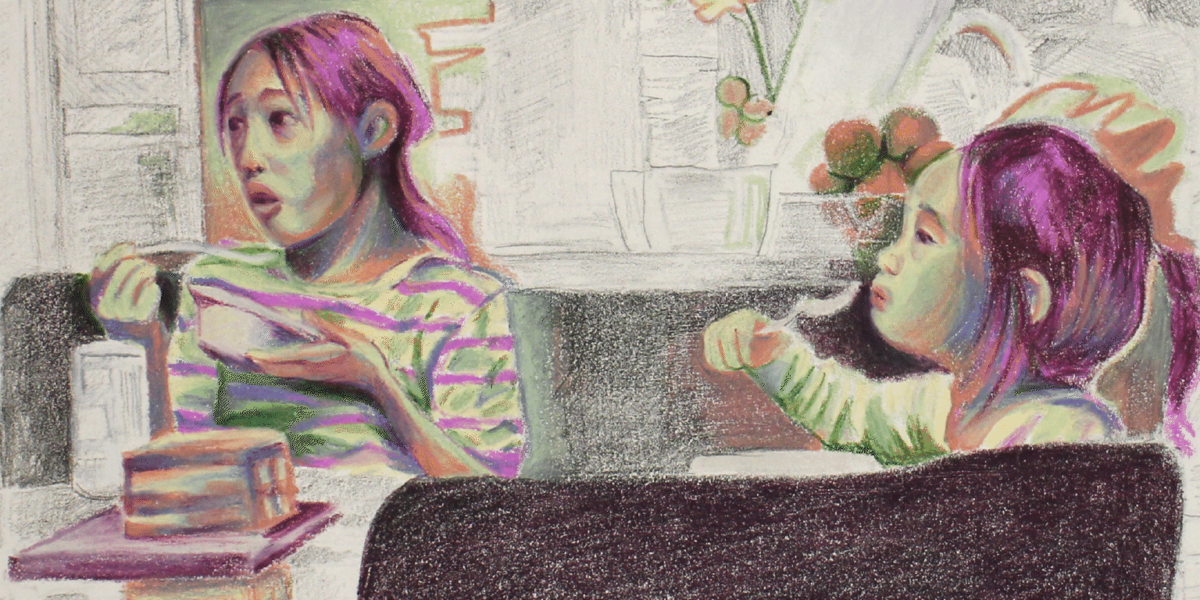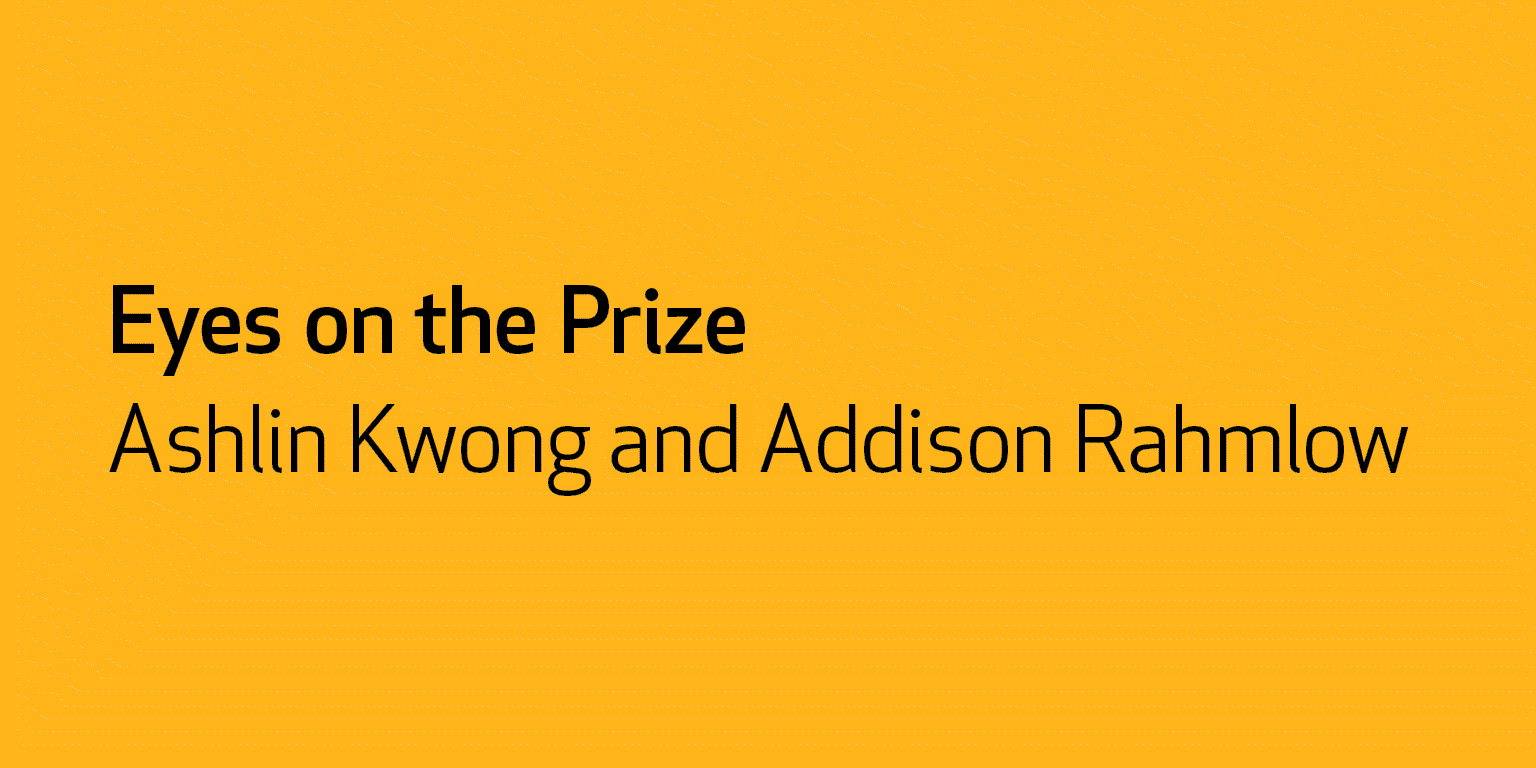A Gold Medal Portfolio Award is the highest honor students can receive in the Scholastic Art & Writing Awards. Jurors choose portfolios by high school seniors whose works best represent the Scholastic Awards’ judging criteria: originality, skill, and the emergence of a personal vision or voice. These remarkable artists and writers will each receive a $12,500 scholarship.
For the next few weeks, we’ll be profiling the 2024 Gold Medal Portfolio recipients. Next up are Ashlin Kwong and Addison Rahmlow.
Ashlin Kwong
Maurice R. Robinson Fund Art Portfolio Award
My artwork explores the Asian-American community through a historical and political lens. My pieces explore societal & personal tensions, typically exploring immigration and the changing perceptions of Asian-American communities. All my artwork starts as a thumbnail sketch, which I create in pencil in my notebook. I then take reference photos based on these ideas, then create digital mockups using my own photos and those from other sources. These collages guide my final piece, which usually contains a watercolor underpainting and then a colored pencil body.

Addison Rahmlow
Merson Family Writing Portfolio Award
Last summer, I experienced an intense bout of writer’s block. Though stories have long since consumed
my every thought, it seemed that as soon as the sticky Midwestern heat set in this past June, the words
once lingering on my tongue melted with it. So, naturally, I did what any burnt-out artist might do—I
stepped away from my keyboard, shoved my stories down into a pit in my stomach, and pretended that
they didn’t exist. The three months I spent without the familiar comfort of my words were perhaps the
most busy of my life. From seeing my extended family for the first time in years, to spending a month
studying in Barcelona, to returning to the States for a long-awaited knee surgery, I spent the summer
paraded by others’ voices—there was always a steady chirping in my ear. When I finally sat back down
to write again, I couldn’t help but think of their constant chatter—the words of my friends, my family, my
neighbors. Therein was born the idea of my portfolio: a rendering of the voices that never failed to slip
from my mind even when I was struggling to find my own. The attached collection, a selection I’ve
decided to entitle Around the World & Back Again, is a love-letter to the art of storytelling.
Letter to the Grandmother I Never Met
And this is what loneliness is: looking up at the sky and feeling nothing. Nothing at all. And this is what
pain is: tracing the circles on your palms and wondering if all the women before you looked down at their
bodies and wondered what it’d feel like to peel off their own skin. To be lonely is to watch the Honda
Civic outside your window pirouette on black ice and gasp, to be in pain is to imagine yourself inside the
vehicle, imploding like some distant star.
***
The first time I felt lonely I was surrounded by so much water, Grandma. All stories start with pain: mine
started in an ocean of God’s spit. I remember pinching the red out of my cheeks, skin all saggy and gelid,
my stomach spilling out into the waves of Kachemak Bay. The sea cradled us like an angry mother that
day, the vessel listless as if drugged in a slippery bubble of amniotic fluid. I didn’t know where we were.
I couldn’t tell the shoreline from the sky. How funny is it that you can be surrounded by so much life yet
still feel utterly and completely alone?
To be honest, I do not know why I am writing this to you. Right now, it is snowing and it looks as if the
moon has shattered into a million tiny shards. I want to go outside and dance in it, to kiss the flakes as if
they’re craters. You see, this is what I do, Grandma. I take pieces of wholes and place them together into
pretty sentences as if they’re meant to be poetic. I am a liar. I hate the snow. To be honest, I am writing
this to you because I am trying to explain, but I don’t know what I am explaining. (Liar). I’ll try again.
I don’t remember anything else from the day I vomited over the side of my grandpa’s boat except for
blood. It pooled red like fat strawberries and flooded up the metal dock grates. I didn’t know that it was
possible for a fish to even carry that much blood in its limp body. I didn’t know that it was possible to
look so languid in death. I didn’t know anything at all.
Six summers ago I got swimmer’s itch from the lake off Highway Z. My skin was raw for weeks and
there were little welts sprinkled underneath my forearms. I had curled myself up like a fetus in the
shallow section, the muddy water slipping all around my eyelids. I don’t think I moved for minutes,
content just to bob in place as the sky rocked above me, a midsummer storm pulsing on the horizon. I
didn’t realize I was holding my breath until I had floated into the lily pads and the rain had started to
trickle down. By the time I ran back to the car my breath had returned, but my skin was already starting to crawl.
That’s why I’m afraid of water, Grandma. I’m afraid that I’ll forget I’m drowning.
***
Sometimes, before I fall asleep, I imagine seeing my own ghost. The professor at a writing camp I went to
two years ago called it negative capability. Half-consciousness. He smiled a half-moon smile and
highlighted a line of Whitman’s (half-moon smiles are always the worst, Grandma; you can’t tell if
they’re real or not). Do you want to guess which Whitman line he highlighted? I contain multitudes. I
smiled a half-moon smile back.
Contrary to his opinion, I don’t think it’s negative capability, Grandma. I’m tired. That’s why I imagine
seeing my ghost. (I think she’s tired too). When she looks at me, I can see it in her eyes: deep and endless and wandering like a pair of lost planets. She’s exhausted. She’s trying to breathe.
I imagine she hates the sight of her own body yet spends too much time in front of the mirror. I can tell
just from looking at her. She kneads the skin on her cheeks and lets it loll between her fingers. She stays
up past midnight staring at the ceiling, and says yes when someone asks if she’s okay. She’s not.
She’s not?
The first time she sees a beautiful girl she bites down on her tongue so hard she swallows a mouthful of
her own blood. It’s not a cliche to say the world stops, because it does. The sun swells up and sinks
heavily into the horizon, watching her as she stands on the yellow linoleum of her school hallway,
thinking a thousand things at once. In this moment, she drowns (she’s always drowning). In this moment
she decides she does not want to feel what she’s feeling. She chews on her cheek until it goes numb. The sun balloons like dough and the sky glows and still she stands there. She hugs a binder of Whitman’s
poems. (She’s tired again). And this is how she dies, Grandma: from convincing herself she’s someone
else.
***
Even when I was born, I wasn’t breathing. I came into the world purple and wheezing and with a ghost. I
came into the world already hating everything in it.
The only thing I remember from that first year is the sound of my mother’s voice. Like metal: shiny but
not untarnished. It’s my voice now, but all the shiny parts are gone. I don’t have much of my mother’s,
but I have her voice.
I could tell you more, Grandma, but I think you now know everything about me that you need. The hurt,
the loneliness, the ghost. I could tell you about how, when I was five, my dad would play Lord Huron on
the living room TV. I could tell you about how I cry now whenever I hear one of his songs, how I cry
every time I see the taxidermy deer at our neighbor’s house, its ugly mottled face reeking with death. I
could tell you about all of the times I cried, yet how I didn’t feel a single tear slip down my cheek at my
great-grandfather’s funeral.
But what about you, Grandma? You seem like the type too composed to cry, but I know that’s foolish. In
the only picture I have, your face is glowing like a cloud of phosphorus, which is to say that of course you
cried, because of course you felt something. Remember how I said I didn’t know why I was writing? I
think I know now.
I am writing to give you my story. All of the pieces of it. All of the bloody parts, all of the dead parts, all
of the parts that lay on carpet floors and stare at ceilings, all of the parts that dream of beautiful girls and
all of the parts that hate the world. All of the parts where I am a liar, all of the parts where I call myself a
writer and all of the parts where I look up at the sky and feel nothing. Nothing at all.
I am writing because it is all I can do. I do not know your story. They buried it. All of it. They buried it
because they were ashamed of a woman who knew her place, whose hands were like sourdough—soft
and chapped and sturdy—whose voice was like gold (not metal): gleaming. I do not know how your voice
sounded, but I imagine it was this way. Unfaltering.
Grandma, I am writing to you because I don’t know where you’re buried, but if I did, I would buy a
whole bushel of roses and then you’d know that someone remembers you. That you’re living a little bit
longer. I am writing to you because we are not that different. We’ve both drowned.
So here is all of it. For you.
Here is the fish blood, here is the whisper of my grandfather’s voice, here is the chill of Kachemak Bay
(like the inside of a churning stomach).
Here is the little girl suffocating in the shallow section of an infested pond, here is the thunder cracking
across the sky, the burning mid-July rain.
Here is the ghost of a girl crying in a school bathroom, sucking in her stomach and squeezing her eyes
shut, here she is wondering if it’s possible to love someone else.
And here you are, seven generations lost, staring up at the same sky.
***
And this is where loneliness halts for a second: in the press of a hand to a windowpane, in the flicker of a
star. And this is where pain trembles: in the remembrance of another time. All stories start and finish with
one or the other: loneliness, pain. Yours ended with both; mine started there.
I am writing, Grandma, but my story is still unraveling. I have so much more to tell.
Right now, the sky is all covered in fog and smoke and snow. Somewhere, behind that fat cumulus, I
think I can see your face. But I might be imagining it, Grandma. I am a liar.
To see more Gold Medal Portfolio recipients, past and present, visit our Eyes on the Prize series.

